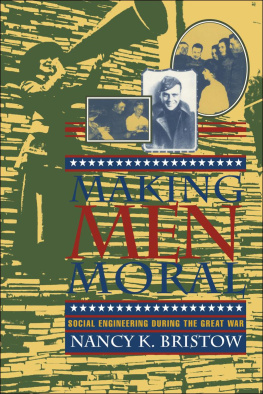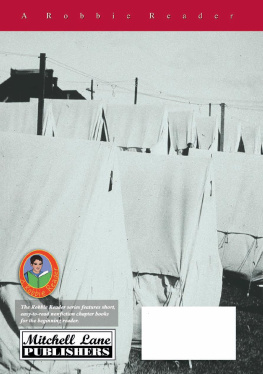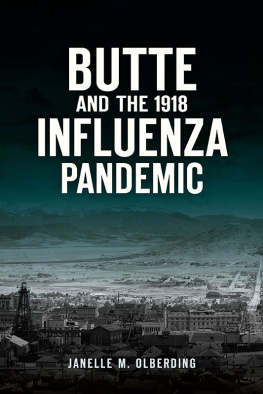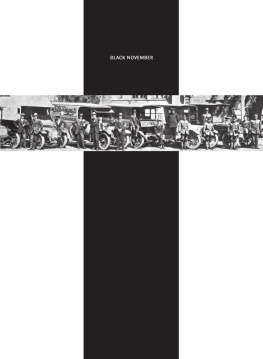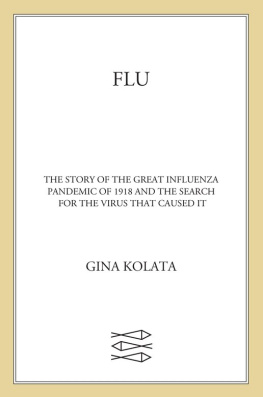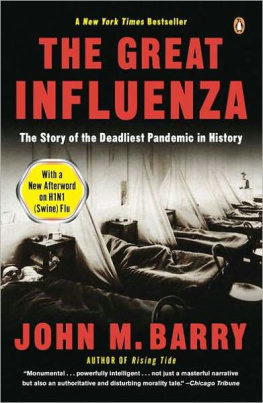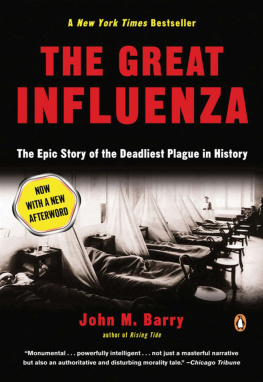American Pandemic
American Pandemic
The Lost Worlds of the 1918
Influenza Epidemic
NANCY K. BRISTOW


Oxford University Press, Inc., publishes works that further
Oxford Universitys objective of excellence
in research, scholarship, and education.
Oxford New York
Auckland Cape Town Dar es Salaam Hong Kong Karachi
Kuala Lumpur Madrid Melbourne Mexico City Nairobi
New Delhi Shanghai Taipei Toronto
With offices in
Argentina Austria Brazil Chile Czech Republic France Greece
Guatemala Hungary Italy Japan Poland Portugal Singapore
South Korea Switzerland Thailand Turkey Ukraine Vietnam
Copyright 2012 by Oxford University Press, Inc.
Published by Oxford University Press, Inc.
198 Madison Avenue, New York, New York 10016
www.oup.com
Oxford is a registered trademark of Oxford University Press
All rights reserved. No part of this publication may be reproduced,
stored in a retrieval system, or transmitted, in any form or by any means,
electronic, mechanical, photocopying, recording, or otherwise,
without the prior permission of Oxford University Press.
Library of Congress Cataloging-in-Publication Data
Bristow, Nancy K., 1958
American pandemic : the lost worlds of the 1918 influenza epidemic / Nancy K. Bristow.
p. cm.
Includes bibliographical references and index.
ISBN 978-0-19-981134-2 (hardback)
1.InfluenzaUnited StatesHistory20th century
2. EpidemicsUnited StatesHistory20th century. I. Title.
RA644.I6B75 2012
614.5180973dc23 2011039800
1 3 5 7 9 8 6 4 2
Printed in the United States of America
on acid-free paper
TABLE OF CONTENTS
ACKNOWLEDGMENTS
As I have tried to write the history of the people who lived and died in the pandemic I have felt a deep gratitude to the voices of the past that have made such work possible. This gratitude carries with it a tremendous sense of responsibility to do justice to the stories they have shared. I feel a similar sense of both gratitude and responsibility to the countless people and institutions whose support made this book possible. Perhaps the best part of bringing this work to print is the opportunity to thank them publicly for their help.
Parts of this manuscript were originally published in Its as Bad as Anything Can Be: Patients, Identity, and the Influenza Pandemic, in Public Health Reports, vol. 125 (2010, Supplement 3: Influenza Pandemic in the United States), and You cant do anything for influenza: doctors, nurses and the power of gender during the influenza pandemic in the United States, in The Spanish Influenza Pandemic of 1918-19: New Perspectives, eds. Howard Phillips and David Killin-gray (London: Routledge, 2003), 58-69, 262-266. I thank both publishers for allowing me to reprint portions of those essays here.
I am deeply grateful for the sustained financial support of the University of Puget Sound, which has come in the form of sabbatical leaves, Martin Nelson Summer Research Grants, and a John Lantz Senior Sabbatical Fellowship, and to the National Endowment for the Humanities, which provided generous support with a fellowship in 2003-2004. I also owe a great debt to Oxford University Press, and to all of the talented people there who have handled my work with exceptional professionalism. I am particularly grateful to Niko Pfund for his continuing support of my work, and to Susan Ferber, editor extraordinaire. I thank her for her remarkable insights, her persistent patience, and her ability to help me see the forest as well as the trees. This is a much better book because of her. I also thank the anonymous reviewers who read this book in draft form and provided superb guidance to me. I hope they can see the positive results of their efforts here.
Because primary sources on the pandemic are notoriously difficult to find, I have been unusually reliant on the genius of archivists and librarians. I am deeply indebted to several: Mitch Yockelson and Bill Creech at National Archives I; Tab Lewis at National Archives II; Ken House at the National Archives in Seattle; Deborah Osterberg at the National Archives in San Francisco; Kathy Goss at the Hazel A. Braugh Records Center of the Red Cross; Steve Bartell at the New York City Municipal Reference and Research Center; Richard Sommers, David Keogh and Pam Cheney at the U. S. Army Military History Institute; Jeffrey Anderson at the College of Physicians of Philadelphia; Maureen Burton and Andrew Basden at the National Library of Medicine; Scott DeHaven at the American Philosophical Society; Helen Sherwin at the Nursing Archive at Boston University; David Klaassen at the Social Welfare History Archives at the University of Minnesota; Lois Hendrickson and Penny Krosch at the University Archives at the University of Minnesota; Susan Sutton at the Minnesota Historical Society; Jill Costill at the Indiana State Library; Regina Rush in Special Collections at the University of Virginia; Michael G. Rhode at the Otis Historical Archives at the Armed Forces Institute of Pathology; Betsy Weiss at the Barbara Bates Center for the Study of Nursing at the University of Pennsylvania School of Nursing; Dolores Judkins and Jeff Colby at the Oregon Health Sciences University Library; Gail Rodgers Redmann at the Historical Society of Washington DC; Joellen El Bashir and Ida Jones at the Moorland-Spingarn Research Center at Howard University; as well as the staffs at the Library of Congress, the Idaho State Historical Society Archives, the Bancroft Library at the University of California at Berkeley, the Still Picture Branch of the National Archives, Sterling Library at Yale University, Schlesinger Library at Radcliffe University, the Washington D.C. Public Library, the Schomburg Center for Research in Black Culture, and the Columbia University Oral History Project. For their help with images I am very grateful to Scott Anderson at the Sharlot Hall Museum; Colleen Holt at the Jerome, Arizona Historical Society; Beth Alvarez at the University of Maryland; Coi Drummond-Gehrig at the Denver Public Library; the folks at Digital Services at the University of Virginia, and Susan Sutton at the Indiana Historical Society. Many of these people went far beyond what I could have asked for. I also offer special thanks to Peggy Burge at Collins Memorial Library at the University of Puget Sound for her expertise and her ceaseless support of my research and my teaching.
I am especially appreciative of the scholars who work on the history of the 1918 pandemic, both those who did the path breaking that made my work possible and those who have provided me with a community of colleagues. This book has been improved immeasurably through opportunities to present pieces of it at conferences, including the Organization of American Historians Annual Meeting in 2005, and the American Association for the History of Medicine Meetings in 2001, 2002, and 2004. Three special conferences dedicated to influenza were profoundly influential in shaping this work. I would like to offer special thanks to Howard Phillips and David Killingray for Spanish Influenza After Eighty YearsReflections on the Influenza Pandemic of 1918-1919 at the University of Cape Town in September 1998, to Alexandra Minna Stern and Howard Markel for the Workshop on the History of the 1918-1919 Influenza Pandemic in the United States at the Center for the History of Medicine at the University of Michigan in May 2009, to Michael Bresalier and Patrick Zylberman for After 1918: History and Politics of Influenza in the 20th and 21st Centuries, at the Ecole des Hautes Etudes en Sant Publique in Rennes, France in August 2011, and to all of the scholars who helped to make these conferences models of intellectual engagement and exchange. I also thank Jeffrey Anderson for his help with the blues, James Armstrong for inspiration and conversation, Jeffery Tauben-berger for the remarkable tour of his laboratory, Howard Phillips for his ongoing support of my work, James Higgins for leading me to
Next page

